

Colorado River's indelible mark


Brasil
Diary/Photo Journal
Long Week of December 01 - December 11, 2010
This long week started with our overnight and rather uneventful flight on December 1st and arriving in Curitiba, Brasil on December 2nd. We were amused to notice that we left Southern California under sunny, but chilly skies, paused in Chicago with temperatures hovering around 25 degrees Fahrenheit and landed in Curitiba with 25 degrees Celsius (around 80F degrees). Let the Summer begin!
  |
Leaving Southern California Colorado River's indelible mark |
  |
Views of Sao Paulo, Brasil |
We got into Curitiba easily and with very little jet lag (as the entire flight experience took about 20 hours). It was great to see Gerson's family and we quickly made the rounds to his aunt and uncles, nephew and cousin's homes. We only stayed a few days before jumping onto another plane, this time up to the northeast of Brasil (via Brasilia).
It had been a longtime dream for Gerson to visit an island reserve called Fernando de Noronha, several hundred miles off the coast near Recife, Brasil. Our plan was to spend a few days around Recife and then onto yet another plane to fly out to the island wherein we were to spend a week frolicking in the sun and swimming with the protected local inhabitants.
Gerson's all-grown-up niece (and WOW, has she grown
up to be quite the dynamic young lady) Flavia,
 and her gentleman friend, Helio, joined us for the excursion.
and her gentleman friend, Helio, joined us for the excursion.
We wandered around Recife for the evening and found it to be a lively place full of people hustling here and there for work and for shopping (as the holidays are upon us). I found myself really liking the bustling streets dotted with various cafes and kiosks and people just pulling up a stool at some random cart to grab a bite and a beer. Perhaps it was the lack of touristy feel to some of the areas that I liked most.
We made the most of our next day visiting a quirky ceramic museum, Oficina Ceramica Francisco Brennand. The working ceramic factory has an extensive exhibit of its artist's work and there definitely was a rather sexual theme throughout. I would say Senior Brennand loved to "write" in ceramic form.
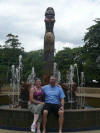 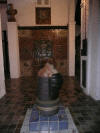 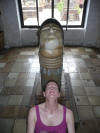 |
Oficina Ceramica Francisco Brennand and some of the works of art on exhibit. |
   |
Gerson blending in
A close look will Beautiful courtyard |
The ceramic factory is still making its tiles that adorn much of the floors and walls of the homes and hotels in Recife. The Oficina Brennand emerged in 1971 from the ruins of an early 20th-Century brickworks (built in 1917) and became a passionate, if not bizarre project for the artist, Francisco de Paula Coimbra de Almeida Brennand.
  |
We become art ourselves Interesting view of things... |
 |
I tried to get Gerson to pose like
these statues but he said he did not want to embarrass the statues by making them look too small! |
After our introspection in the presence of the ceramic art, we toddled off to a beach called Itamaraca (Eat-a-mar-a-ka) for a casual lunch on the sand. A pleasant little place and the drive was punctuated with quaint churches and colorful streets.
    |
Fishing boats lined up near Recife Quaint little churches Colorful streets |
   |
Flavia showing off her coconut (not coconuts...get your mind out of the gutter) Helio and a friend Ahhhhhhhh! |
Our time at the beach was short lived as we wanted to visit the Ecoparque Peixe-boi (Eco park Manatee), which is an aquatic mammal center where they rescue manatees and try to rehabilitate them to return to the ocean. It was nice to see these peaceful mammals basking in their pools and watching for their noses to break the surface when they were bobbing up for food.
A little known tidbit about manatees. It is thought that the myth of the existence of mermaids came from sailors having been a little too long out to sea and somewhat superimposing their desires on these rather large, yet graceful creatures.
   |
The Ecoparque Peixe-boi and some of the star attractions |
   |
We wore out the kiddies
Gerson having fun with one of A good way to save gas and |
Our next day near Recife took us south to Porto de Galinhas (chicken port) and we went there to see a special inhabitant that makes its home where a river meets the ocean inlet (Marcaipe - Mar-ki-eep-eh). These locals are very shy and extremely difficult to see in their natural habitat, so to literally swim right up to them and float with them was something out of a dream for me.
What am I referring to? What would you say to being able to just about kiss a seahorse! They are such amazing, delicate creatures and defy nature with every movement. Their means of propulsion, their parenting habits (the male gives birth), etc., set them apart from other living things.
We located an experienced guide, Miguel (probably all of 10 years old) and he herded us to the river's mouth and to where we would meet our boat captain, or rather, the skiff captain. With a long pole in hand, the captain pushed our skiff up the river to where we would meet our special friends.
The river and ocean inlet is also thick with mangroves which shelter oysters and crabs which are a regular menu item for the local restaurants (when in season). After our walk back from the seahorsery (ok, I made up that word), we got to watch several kite boarders taking advantage of the gentle breeze and mild waves along the shore.
We landed ourselves at Porto de Galinhas and in no time, Gerson was being serenaded by a "musician" trying to convince Gerson to buy his CD (needless to say, we have a new CD for our music collection). Enjoying cold beer and some shrimp and fish, we lazed about on the beach and ventured out for a snorkel along the nearby reef. All in all, a very nice day.
Our last day around Recife was spent just a bit north in a small and historic town of Olinda. We stayed at a wonderful little place called the Pousada do Amparo that was built in the mid 1700's and was just a wee bit out of kilter. It did not take long for us to drop our luggage and head out to explore this step back into time.
Olinda is one of the best-preserved colonial cities in Brasil and many of the buildings were built in the 1600's - 1700's. Artists studios, museums and music infused corners abound and Olinda is the home of one of the most fantastic Carnaval celebrations in Brasil.
During Carnaval, people don huge life-like "body puppets" and parade down the crowded streets, singing and dancing as they walk. As Carnaval is only a couple of months away, preparations are already taking place.
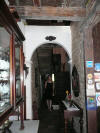 |
  |
Pousada do Amparo Our room and the
|
|
 |
Olinda
Our guide, and fantastic
|
It was not long before we connected with a "guide" and we were walking all over the town popping into just about every church and local museum along the cobblestone streets.
Inasmuch as we joked that there was not a church we had not seen, each had their own uniqueness and beauty (although some much more opulent than others). We had a nice lunch at a local "by kilo" restaurant that was like dining in the middle of a garden and we had to stop to take our pictures in front of a huge 100 year old ficus tree.
A very interesting little place was the museum for many puppets (Museu do Mamulengo) that represents the culture of the area. Colorful would not quite describe the various rooms with the caricatures of people and creatures that are embedded in the stories of Olinda and the surrounding areas.
One building we wandered into was a bit of deja vu for Gerson and me because of the blue and white Portuguese porcelain tiles beautifully covering the courtyard walls and some of the interior room's walls. The Sao Francisco de Assis was a convent and as like we saw in Ouro Preto, the well preserved tile walls told many stories.
We also stepped into the private chapel that gleamed with gold and silver overlays and then off to another wing that let out onto patios and balconies with fantastic views.
    |
|
Sao Francisco de Assis
Inner courtyard and Beautiful ceilings Private chapel |
   |
Sun dial
Views over Old to new |
We continued our meander through Olinda and around every corner, was just another lovely scene that was worthy of a pause and a sigh. We did find ourselves herded to a little tourist market where we were entertained by a young carnaval performer. In this part of Brasil, women dress brightly and with the prop of a colorful umbrella, perform a whirlwind of a dance called Frevo (fray-voh). Our young showgirl was a blur of color and movement, well worth the Reais we tipped.
    |
Sao Bento (church)
More views and |
   |
Our young dance performer
Posing with some of the The local artists mirror the |
We made it back to our pousada in time to get refreshed and head back out for the evening. We headed to Alto da Se, a popular square where many carts are parked and a variety of foods are available for dinner. As it was a slow night, our choices were limited; however, I enjoyed a delicious meal of chicken and cheese wrapped in a tapioca "tortilla". Tapioca is a commonly used food (much like flour) and I found it a wonderful alternative.
While we were sitting and people watching, we could hear a band practicing nearby. With a quick walk down and around a corner, we found a local "marching band" preparing for their Carnaval parade. The group was called "Old Black Man" and it was very interesting to watch them create their music.
If the music surprise was not enough, when we got back to the pousada, we discovered that a building across the street becomes a rather rustic bar, with the customers spilling out onto the street. From our Pousada's balcony, we were right on top of the party and were pleasantly entertained by a fire breathing-tight rope walker. Carnaval in Olinda must be one of the best celebrations in Brasil!
    |
Preparation of the tapioca "tortilla" and the finished product (very good) Band practicing and their |
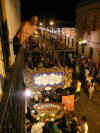 |
  |
The impromptu street party Our entertainment: |
A good night's sleep and we were up and ready to head across out into the open Atlantic Ocean and start our weeklong stay on an island. Fernando de Noronha (No-rown-ya) archipelago (specifically a large portion of its main island), is National Park land and is sparsely populated. Only people born on the island can live there and the "temporary residence/work permits" are a coveted item.
A little history about the island. Fernando de Noronha was discovered by the same adventurer, Juan de la Cosa, who had been the pilot for Columbus (does the date 1492 ring a bell for us Americans?). The islands were a gift from King Don Manoel to Fernao de Noronha in 1504 and were quickly forgotten. As such, the crown took back the gift and the islands were later used by the French, the Dutch, the Portuguese and the United States for a strategic military position (imagine one very good "lookout post" with visibility of hundreds of miles).
Several ruins of forts remain (to the glee of Gerson who never met a fort he did not like) and many other buildings are still around from the Dutch and U.S. influence (we joked we could tell which roads were built by the Americans and which were built by the Brazilians...I will let you figure out how we could tell which was which).
At present, 70% of the archipelago is declared a National Maritime Park and protects marine turtles, sharks, stingrays, dolphins, whales, birds and a vast number of fish species. I would say we swam with all of the island's protected inhabitants.
    |
Flying over Fernando de Noronha and views of its beautiful beaches |
 |
Remnants of a fort and now the historical "downtown" area (Vila dos Remedios) View over Praia do
Cachorro |
We arrived late in the afternoon and found ourselves being taken to a pousada that was rather surprising, and not in a good way. I was very firm in that I would not stay there as it just seemed impossible that this was considered a "mid level" pousada as we had requested (apparently, if you do not ask for a specific pousada, you are lotteried to a pousada within three levels: low, mid and high).
The pousada was bare bones, dirty and worse, undergoing a renovation so our room was right next to a room being renovated (eg: smelled horribly of wet plaster and paint and the workers would be hammering all day). Add to this that the bed collapsed in the middle, the upper deck was so openly spaced that the workers underneath had a clear view up a woman's dress, the receptionist was visibly (and physically) sour toward us...absolutely not welcoming.
I usually would not make a fuss; however, the cost to stay on the island was astronomical and the pousada was nothing like what was described. Within an hour, the tour company arranged for us to stay at the Pousada Biu (bill), a comfortable, clean, cozy, bed-and-breakfast type pousada that was well located and run by a very nice woman, Livia.
We later found out that the first, wretched pousada was owned by the daughter-in-law of the island's rather wealthy owner of the top-most pousada, who happened to be in partnership with a part-owner of the tour company (can you say nepotism!). There is a good chance that within the next ten years, the island will be run by two families (one being the born-on-island family and the other the wealthy family of Jose Maria).
As we had arrived in the afternoon, we had enough time to sort out our pousada arrangements, drop our bags and take a walk to the downtown area. We took advantage of what light we had and found a nice little spot to eat dinner.
Our first day was spent rounding up our transportation for the seven kilometer island (approximately 10 miles across) in the form of a sand buggy. Seeing Gerson fold up in half to fit in the buggy was fun in and of itself and Flavia and Helio commandeered the back seats for their hang-on-for-dear-life riding experience.
Exploring the island took us to the harbor and over to a protected point where shark sightings are common. We were not disappointed as we easily spotted several lemon sharks basking in the sun in the shallow waters of a small bay near Ponta de Santo Antonio.
Appropriately, there was a shark museum near to the shark cove, Museu do Tubarao (Tube-ar-own). We popped in to read about the sharks and view some of the amazing shark jaws displayed. Fortunately, we did not run into any of the more aggressive living owners of these jaws.
With map in hand, we were then off to our first beach indulgence, Praia do Leao (lee-own - beach of the sea lion). Walking along the cliff and down through the uncut brush, we broke out over a stretch of beach that took our breath away. The sand seemed untouched and the waters shimmered in translucent blue and turquoise.
We spent a few hours enjoying the beach (and me using an entire bottle of sunblock - yes, I was at my English best) and we wasted no time baptizing our snorkel gear. The water temperature was absolutely perfect and immediately upon entering the water, we found ourselves surrounded by colorful fish.
With a sigh, we left the Praia do Leao and returned to our pousada for showers and the all important, dinner determination discussion. We decided upon a wonderful little restaurant recommended by a French couple we met in our pousada in Olinda and it did not disappoint. It was a wonderful meal and sitting outside overlooking the stone street just added to the ambiance.
Afterward, we stopped in at the Projeto Tamar to watch a video on the conservation of the Galapagos Islands and take part in a talk about the turtle conservation and protection project on Fernando de Noronha.
Our first day on Fernando de Noronha was just a prelude to more fantastic days to follow.